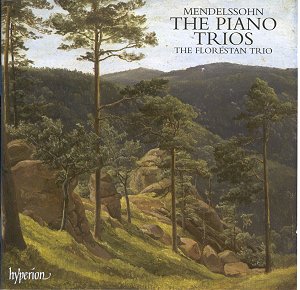These magnificent performances
have taken nearly two years to appear.
Good that they have finally seen the
light of day, for this is a disc to
treasure. The reputation of the Florestan
Trio is already high and this provides
firm confirmation of the ensemble's
stature.
The two trios are separated
by six years. The C minor is perhaps
more tempestuous than the D minor, and
as such they make admirable bedfellows.
Trust me, such is the generosity of
invention, you will not quarrel at the
low playing time of the disc. Coupled
with Mendelssohn's gifts are those of
the Florestan Trio, which plays with
complete unanimity of interpretative
purpose. This is true chamber music
playing that at times verges on telepathy.
The recording is superb perspectives
are natural and clarity is all.
Susan Tomes proves
herself a virtuoso. Not a virtuoso of
the barn-storming type, more a consummate
musician who happens to be able to play
the huge number of notes, often delightfully,
in small time-slices.
The D minor Trio's
first movement (Molto allegro agitato)
has a real sense of flow, as has Mendelssohn's
invention. This is coupled with an urgency
and concentration thought that suffuses
the reading. The Song Without Words
slow movement, in contrast, projects
a veiled, crepuscular mood here perfectly
caught; the Scherzo is as elfin as they
come. Mendelssohn takes this lightness
forward into the finale and works with
it, almost taking it for a walk through
a variety of mood-transformations, including
the lyrical. The Florestan Trio is alive
to every subtle harmonic shift, every
nuance. Superb; as it is also in the
C minor Trio. Although not as popular
as the D minor, its very darkness is
what gives it its appeal to this reviewer.
Certainly the Trio injects fire and
grit into the climaxes of the long and
exploratory first movement (a ten-minute
'Allegro energico e fuoco') before revelling
in the harmonic warmth of the Andante
espressivo. The urgent dynamism of the
Scherzo - which buzzes with energy -
leads to a powerful finale, a fascinating
movement with chorale references and
yet a sense of Mendelssohn testing the
boundaries of just how much energy chamber
music can take. It is one of those movements
- as presented here - that seems almost
to call for greater heft and yet,
one knows that any change would be to
ruinous.
In
a field where there is much competition
(Trio Parnassus on Dabringhaus, or the
Beaux Arts disc of the First coupled
with Dvořák's Dumky on Warner Classics
2564 61492-2), the Florestan
has to be given a first recommendation.
Booklet notes (Robert Philip) are as
always with this company extended, and
a model of clarity. Very strongly recommended
indeed.
Colin Clarke


